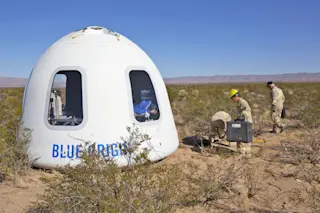Blue Origin's New Shepard capsule, which Blue Origin CEO Jeff Bezos hopes to use to ferry passengers and experiments into space this upcoming year. (Credit: Blue Origin)
The upcoming year is shaping up to be a big one for private spaceflight. A number of big players in the race to get paying passengers to space seem poised to actually make that happen, and companies like Boeing and SpaceX have announced a number of ambitious goals. It looks like they might be beat by the Brit, though. Last week, billionaire entrepreneur Richard Branson claimed that his company Virgin Galactic will send astronauts into space by Christmas of this year. Branson told CNN that he is “pretty confident” about this goal. "We have a brilliant group of astronauts who literally believe 100% in the project, and give it their everything," Branson said to CNN. Virgin Galactic’s rocket-powered plane SpaceShip Two will make ...














